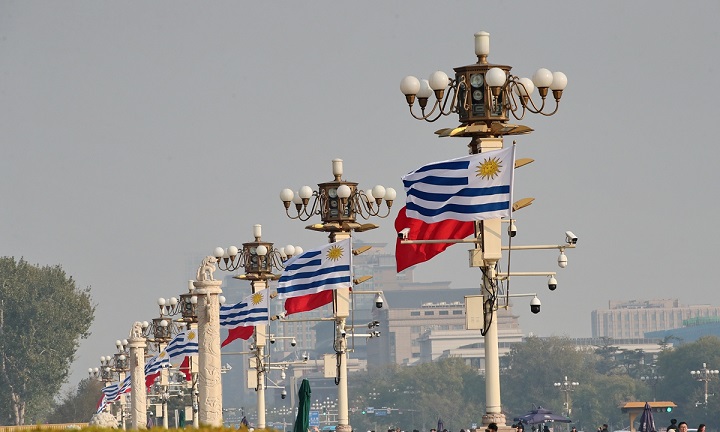
On the fifth anniversary of Uruguay’s participation in the Belt & Road Initiative (BRI), China and Uruguay announced they will upgrade bilateral ties to a comprehensive strategic partnership during talks between the two heads of state, and agreed to deepen cooperation in a range of aspects including trade, agriculture and cultural exchanges, as well as the co-construction of the BRI.
The two heads of state witnessed the signing of the cooperation plan to jointly build the BRI, as well as a number of bilateral cooperation pacts in the fields of trade and investment, digital economy, green development, agriculture, healthcare, education, culture, technological innovation and customs inspection.
Experts believe that the upgrade of ties between the two countries will promote overall relations between China and Latin America, which are at their highest point in history despite US pressure to pick sides.
It is Uruguayan President Luis Alberto Lacalle Pou’s first ever visit to China, which falls on the 35th anniversary of the establishment of relations between China and the Latin American country as well as the fifth anniversary of Uruguay’s participation in the BRI.
During the talks, Chinese President Xi Jinping told Lacalle Pou that over the past 35 years, the two sides have always adhered to mutual respect, equality and win-win cooperation, which eventually led to the deepening of their relations. Taking this comprehensive strategic partnership as a new starting point, China is willing to work with Uruguay to build bilateral ties into a model of cooperation between countries of different sizes, systems and cultures.
The elevation of ties is of great significance to both sides, experts believe, as it is not only a recognition of friendship and closeness, but also sets a new direction for future bilateral relations.
Wu Hongying, director of the Institute of Regional and International Studies at Hubei University, believes the upgraded ties will promote overall relations between China and Latin America, and she said the region’s strategic support for China will become even stronger.
“It can be said that China-Latin America relations are currently at their highest point in history,” Wu told the Global Times on Wednesday.
During the meeting, Xi noted that China is willing to enhance political mutual trust with Uruguay, and closely cooperate in legislative institutions, political parties and local exchanges. The Chinese president called on both sides to cultivate new drivers of cooperation in the services trade, digital economy and clean energy, among other fields, to promote the high-quality development of the joint construction of the BRI.
China welcomes more high-quality agricultural and livestock products as well as high value-added products from Uruguay to enter the Chinese market, and encourages Chinese companies to invest in Uruguay.
For his part, Lacalle Pou said the Uruguayan government recognizes there is only one China in the world, and peaceful reunification is an internal affair of China that must be decided by its people.
Lacalle Pou expressed the hope to strengthen cooperation in areas such as the economy, trade, science and technology, sports and tourism, adding that his country supports the establishment of more Confucius Institutes in Uruguay to promote people-to-people exchanges. Uruguay also looks forward to accelerating free trade cooperation with China.
Uruguay has been one of the most proactive Latin American countries in developing ties with China, and bilateral trade has grown rapidly in recent years with China becoming Uruguay’s largest trading partner, Sun Yanfeng, director of Latin American research at the China Institutes of Contemporary International Relations, told the Global Times on Wednesday.
Uruguay is hoping to seize the opportunity of Chinese investment to assist in its modernization of industries and infrastructure, and cooperation in high-tech fields, while aiming to establish itself as a gateway to China for Latin American countries, Sun noted.
Bilateral trade volume between the two sides reached $7.44 billion in 2022, 60 times more than when the two countries established diplomatic ties 35 years ago. In 2022, exports to China accounted for about 30 percent of Uruguay’s total exports, reaching a historic high.
The ever-close partnership between China and the Latin American country has drawn jealousy and anxiety in the West, with hype that Beijing’s growing influence in the continent is “squeezing out” Washington’s.
The US is creating this tension and pressurizing Latin America to pick sides, but China has always believed that the world is big enough for both to develop ties with Latin American countries, observers noted.
“What the US left Latin America is political intervention, military invasion, economic colonization and lip service with no tangible results. To the contrary, China has brought many tangible benefits to Latin American countries through concrete cooperation agreements such as the BRI. Therefore, Latin America is naturally more willing to have practical cooperation with China rather than the US,” Sun said.
Source: Global Times, Nov 22, 2023. https://www.globaltimes.cn/page/202311/1302295.shtml